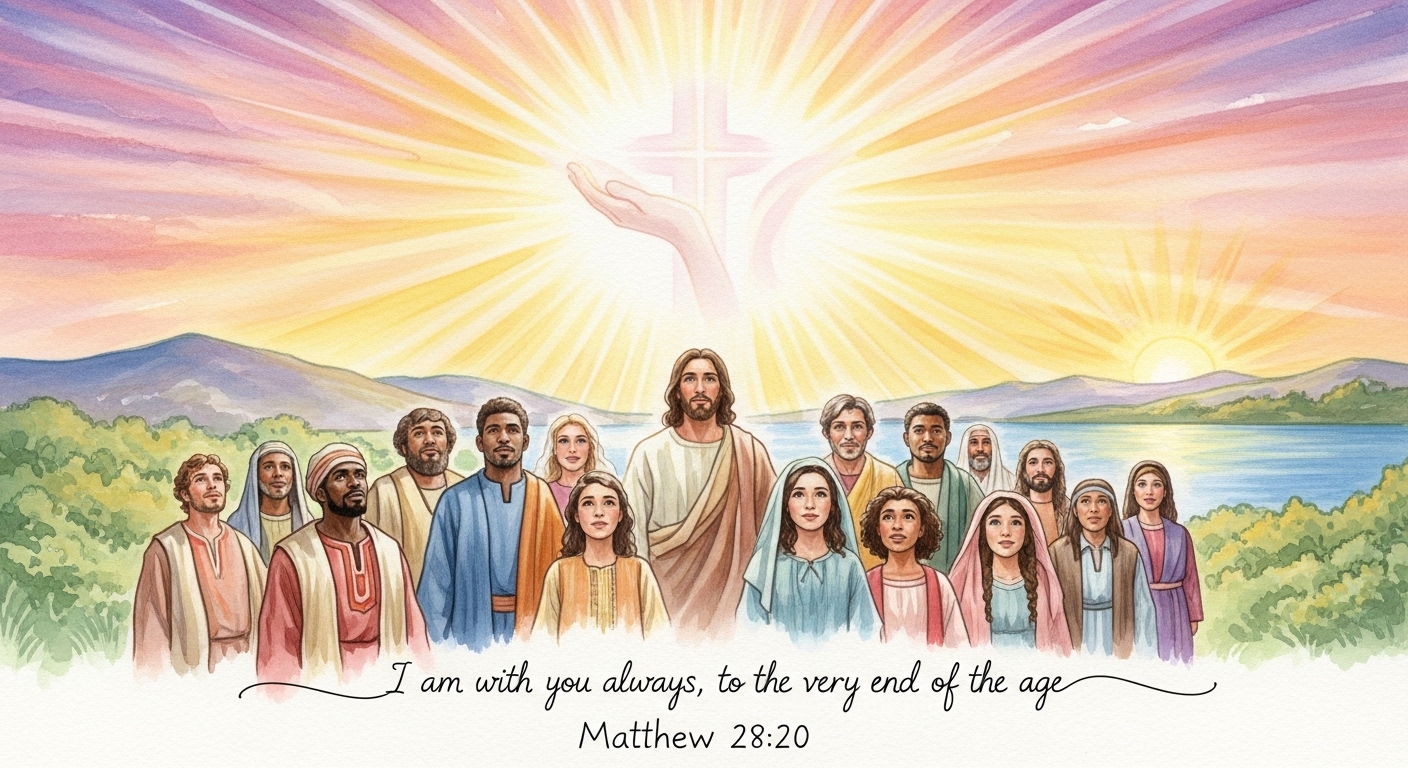How To Recognize God’s Presence In Everyday Life
You want to recognize God’s presence in the middle of your ordinary days — while you brew coffee, walk to work, argue with a loved one, or sit in quiet at night. That desire matters. It shapes how you live, gives you courage when things are confusing, and quietly rewires how you pay attention. This article helps you learn to notice God in the small and the mundane, giving you practical steps, biblical foundations, and honest ways to respond when you don’t feel anything at all.
You won’t always feel dramatic encounters or have visible signs from heaven, and that’s okay. Recognizing God’s presence often begins with small shifts: an unexpected sense of peace, a timely word, a conviction that leads you to choose mercy instead of anger. Over time, those small moments grow into a habit of seeing God’s fingerprints all over your life. Throughout this article, you’ll see how to cultivate that habit and how scripture points you toward God’s nearness.
Why You Should Try to Recognize God’s Presence
Being able to recognize God’s presence changes how you interpret your life. When you expect to notice God, you stop assuming your successes are only accidental and your struggles are only random. You begin to see meaning, purpose, and guidance woven into ordinary events.
Recognizing God’s presence is not about superstition or trying to manufacture spiritual experiences. It’s about training your heart and mind to be awake to God’s ways. Scripture invites you to live with this awareness. When you practice it, prayer becomes less like a checklist and more like an ongoing conversation. Your daily decisions get recalibrated by faith instead of fear.
The Biblical Basis: God Is Near
The Bible is full of assurance that God is near, even when you don’t sense it. This is a foundation you can trust: God promises to be present with you, and scripture gives you language to understand that presence.
- Psalm 139:7-10 invites you to remember that there’s nowhere you can go to escape God’s Spirit. That reality is the bedrock of recognizing God’s presence — it’s a truth even when your emotions disagree.

- Matthew 28:20 includes Jesus’ promise, “I am with you always,” which points you to a continual, abiding presence.

- Hebrews 13:5 gives a sobering reminder: “Never will I leave you; never will I forsake you.” This reassures you that God’s presence is not transactional or fickle.

When you learn to recognize God’s presence, you’re not inventing experiences; you’re aligning your perception with what scripture already says about God’s nearness.
How God Shows Up Biblically (and What That Means for You)
God’s presence happens in multiple ways: through the Holy Spirit living in you, through community, through scripture, and through the ordinary structures of life. Recognizing God’s presence means being alert to these various channels.
The Holy Spirit Dwells With You
Jesus promised the Spirit to help and guide you. The Holy Spirit is the most intimate evidence of God’s presence.
- John 14:16-17 describes the Spirit as an advocate and the Spirit of truth who lives with you and is in you.
- Romans 8:9 makes it clear that if the Spirit of God dwells in you, you belong to Christ.
So when you feel conviction, encouragement, or sudden clarity, that inner whisper may well be the Spirit — a practical sign that helps you recognize God’s presence.
God Shows Up Through Scripture
The Bible is described as a living, active means by which God communicates and forms you. Reading and engaging scripture tunes your spiritual senses.
- 2 Timothy 3:16-17 reminds you that Scripture equips you for every good work. As you read, you’re likely to notice truths that speak directly to your current situation.
- Psalm 119:105 — “Your word is a lamp for my feet” — is a metaphor you can depend on when you want to recognize God’s presence in decisions.
When a verse hits you at the right time, that immediate, fresh relevance is a way God’s presence becomes visible to you.
God’s Presence in Community and Worship
You’ll often recognize God’s presence among others — in shared prayer, worship, and acts of service. Community is not optional for spiritual awareness; it’s a primary medium through which God moves.
- Hebrews 10:24-25 encourages you not to give up meeting together, implying that community helps you sharpen and notice God’s work.
- Matthew 18:20 says that where two or three gather in Jesus’ name, He is there among them — a promise that helps you recognize God’s presence in small group settings.
Worship, whether private or corporate, often opens your heart to notice God’s nearness more readily.
Everyday Signs That Help You Recognize God’s Presence
You don’t need lightning or audible voices to know God is with you. Start learning to notice subtle, repeated signs.
Peace in the Middle of Chaos
One of the most reliable ways to recognize God’s presence is experiencing peace that doesn’t fit your circumstances. This is not a blunted awareness of trouble; it’s an inner steadiness.
- Philippians 4:6-7 connects prayer and thanksgiving with a peace that guards your heart and mind. When prayer brings real settling, that’s a clue God is near.

You’ll notice this kind of peace more often when you practice turning anxieties into petitions and thanksgiving.
Conviction Rather Than Condemnation
A gentle tug toward change, repentance, or apology is often the Spirit’s work — not condemnation to crush you, but conviction to free you.
- John 16:8 describes the Spirit’s role in showing the world’s wrongs and prompting repentance. When you feel a sober but loving call to change, pay attention; it’s a sign you can recognize God’s presence guiding growth.
If the voice in you leads to humility and restoration, it’s more likely the Spirit than mere guilt.
Timely Encouragement or Provision
God’s presence can be practical: a word from a friend right when you needed it, an unexpected opportunity, or finances arriving just in time.
- Matthew 6:25-34 teaches about trusting God for provision. When things fall into place in ways that point beyond coincidence, those are moments to notice and thank God for His nearness.
Recognizing these moments trains you to see providence instead of randomness.
Fruit in Your Life
One of the most observable ways to recognize God’s presence is the evidence of spiritual fruit: love, joy, peace, patience, and the rest.
- Galatians 5:22-23 lists the fruit of the Spirit. When you see these qualities growing in you — especially in tough seasons — that’s a clear sign God is at work inside you.
Fruit doesn’t always bloom overnight, but steady growth signals the Spirit’s presence.
Practical Spiritual Disciplines to Help You Recognize God’s Presence
You want practical steps you can practice each day. Spiritual disciplines aren’t ends in themselves; they’re ways you train your senses to notice God at work.
Silence and Stillness
In the noise of modern life, silence is a spiritual skill. When you sit quietly and intentionally before God, you create space to recognize God’s presence.
- Psalm 46:10 says, “Be still, and know that I am God.” Being still doesn’t guarantee a dramatic experience, but it removes the busyness that drowns out the small, faithful ways God speaks.
Start with short periods — five to ten minutes a day — and let the practice expand naturally.
Intentional Scripture Reading
Reading the Bible with openness changes the way you notice God during your day. Don’t rush. Read slowly and listen for a word that seems timely.
- Jeremiah 29:13 promises that when you seek God with all your heart, you will find Him. Use scripture as a daily compass for recognizing God’s presence.
You can journal insights, underline verses, or memorize a line that you return to when life gets noisy.
Prayer as Ongoing Conversation
Praying doesn’t have to be formalized for it to be meaningful. Short prayers sprinkled throughout the day keep you connected.
- Romans 8:26-27 shows that the Spirit intercedes for you, especially when words fail. Lean into that reality by letting prayer be both deep and conversational.
When you pray like this, you’ll notice God’s responses more frequently — sometimes as peace, sometimes as a door opening.
Community and Confession
You’ll recognize God’s presence strongly in shared life. Honest conversation, confession, and encouragement help you see God moving through others.
- James 5:16 encourages you to confess your sins to one another for healing. Community often becomes the context where God’s presence is most tangible.
Find a small group or a spiritual friend with whom you can be accountable and transparent.
Service and Sacrificial Love
Serving others is a practical discipline that exposes God’s presence in the concrete world. When you give your time, gifts, or resources, you join God’s work.
- Romans 12:1 invites you to present your body as a living sacrifice — an act of worship that leads you to notice God’s presence in the lives you touch.
Serving refocuses your attention outward and helps you recognize God’s hand at work through ordinary acts of kindness.

Daily Practices to Keep You Alert
You can shape micro-habits that make it easier to recognize God’s presence daily. These are simple and practical.
Morning: Set Your Heart
Begin the day by orienting your thoughts to God. A short morning ritual gives you spiritual momentum.
- Ask God for clarity and presence for the day; read a short passage; pray for a neighbor or coworker. Proverbs 3:6 encourages you to acknowledge God in all your ways so He can direct your path.
This sets a pattern where you’re more likely to notice God acting during the day.
Midday: Check-In and Give Thanks
Pause mid-afternoon for a gratitude check. List two things God has already provided that day.
- Psalm 100:4 calls you to enter His gates with thanksgiving. A quick gratitude habit reorients you to noticing God’s continued presence.
This habit makes you less likely to miss small acts of care and provision.
Evening: Reflect and Record
Before you sleep, reflect on the day and write down moments where you sensed God’s presence or saw evidence of His work.
- Keep a “presence journal” with short notes: a verse that felt relevant, a conversation that mattered, or a moment of peace. Over time, these entries become a visible trail that helps you remember how God has been active.
This practice trains memory and gratitude, reinforcing your ability to recognize God’s presence.
Use Prompts
If you struggle to notice, use prompts: “Where did I see mercy today?”, “What small gift did I receive?”, “When did I feel peace despite pressure?” Answering these questions daily helps you build a recognition muscle.
- The apostle Paul’s life was marked by reflection; you can cultivate a similar discipline by asking honest questions that orient your story toward God.
Obstacles That Keep You From Recognizing God’s Presence (and How to Respond)
You might try these practices and still find it hard to notice God. That’s normal. Several common obstacles can dampen your sensitivity — and you can respond to each of them.
Distraction and Busyness
When your days are crowded, holiness shrinks to the margins. Your first task is not to do more, but to make intentional small spaces for God.
- Psalm 46:10 invites you to be still. Create short pockets of stillness rather than waiting for the perfect long retreat.
Trim activities that steal the best parts of your day and replace them with micro-practices that increase awareness.
Spiritual Dryness
There are seasons when devotion feels flat. That does not mean God has disappeared. It often means you’re invited into patient endurance.
- Psalm 13 models lament — an honest way to bring your dryness to God. Use lament to express your real feelings instead of pretending all is well.
Perseverance in small disciplines — even when you feel dry — opens you back up to recognizing God’s presence over time.
Doubt and Unbelief
Doubt can be honest and even healthy. When it becomes an obstacle, bring it into communion rather than trying to hide it.
- The father who cried, “I do believe; help me overcome my unbelief!” in Mark 9:24 gives you a model for honesty. God can work through your questions and uncertainties.
Ask for help, read scripture, and keep company with believers who can hold space for doubt while encouraging you forward.
Pain and Loss
Grief and suffering can cloud your ability to notice God’s presence. God is with you in the suffering, but the nearness may not always feel comforting.
- Romans 8:28 doesn’t promise that every event will be pleasant, but it does promise that God works all things for good. That truth sustains you even when you can’t feel God’s nearness.
Lean into community, prayer, and scripture during these seasons. Often, presence is discovered in steadfast companionship rather than dramatic consolation.
Recognize God’s Presence in Decision-Making
You will inevitably face choices where you want to know God’s will. Recognizing God’s presence in decisions begins with a framework.
Seek Wisdom and Test the Outcome
Use scripture and godly counsel as your primary filters. Wisdom often means choosing the way that bears spiritual fruit rather than the path that promises immediate gain.
- Proverbs 3:5-6 encourages trusting the Lord with all your heart and acknowledging Him in your ways so He can direct your paths. Ask whether a choice aligns with God’s values.

Consult with wise, mature Christians and evaluate choices against scripture and the fruit they produce.
Look for Peace and Confirmation
A settled heart and confirmation through other people or circumstances can be signs of God’s presence leading you. But be cautious: peace alone is not an infallible guide; it must be weighed against truth.
- Philippians 4:7 shows that peace can guard your heart and mind. If decisions bring a deep, Spirit-given peace and align with biblical wisdom, they can be trusted more confidently.
Be patient with decisions. Sometimes clarity comes after a period of waiting and faithful steps.
Stories and Examples: Recognizing God’s Presence in Small Ways
Real-life examples help you see how recognizing God’s presence can look ordinary and transformative.
You might remember a late-night worry that turned into an unexpected call from an old friend who knew exactly how to pray for you. Or you might notice how a persistent habit of gratitude changed how you respond to stress, leaving you calmer and more generous. Small things — like the right verse appearing at the right time, an inexplicable nudge toward forgiveness, or a practical provision at the eleventh hour — often reveal God’s presence more than dramatic events.
These stories are not proof in a courtroom sense, but they are testimonies of how God tends to meet people: quietly, caring for details, and often through other people’s faithfulness. Collect your own stories in a journal. Over time, they give you a map of God’s faithfulness and help you recognize God’s presence more quickly.
How to Keep Growing: Making Awareness a Lifestyle
Recognizing God’s presence isn’t a one-time achievement; it’s a lifestyle you cultivate. Here are sustainable rhythms that keep you alert and alive.
Keep a Practice of Regular Reflection
Weekly or monthly reflections help you see patterns, not just isolated moments. Review your presence journal and look for recurring themes.
- Colossians 3:16 encourages letting the message of Christ dwell among you richly. Regular reflection helps scripture become the lens through which you view your life.
Reflection prevents spiritual amnesia and strengthens your ability to recognize God’s presence consistently.
Surround Yourself with Encouraging Community
You need companions who can point out God’s work in your life when you can’t see it. Build relationships that celebrate both confession and encouragement.
- Hebrews 12:1-2 urges you to run the race with others, fixing your eyes on Jesus. Shared journeys sharpen your spiritual sight.
Choose communities that help you practice presence through worship, service, and discipleship.
Be Willing to Adjust Routines
Seasons change. What helped you recognize God’s presence last year might need revision now. Be flexible. Try new practices and discard those that no longer bear fruit.
- James 4:8 promises that drawing near to God invites Him to draw near to you. Sometimes drawing near looks different depending on your life stage.
Experimentation — with prayer styles, scripture formats, or service opportunities — keeps your spiritual senses engaged.
Final Thoughts: Recognizing God’s Presence Is a Practice of Hope
Learning to recognize God’s presence is less about collecting spiritual experiences and more about cultivating an expectant posture. When you expect to see God, you’re more attentive to the ways He shows up. Scripture gives you promises to rest on, and the Spirit gives you subtle confirmations in everyday life.
You won’t always feel it, and sometimes you’ll struggle to believe it, but even faith’s small steps are noticed and honored. Keep practicing silence, scripture, prayer, community, and service. Keep a record of God’s faithfulness so you can look back when doubt creeps in. Over time, you’ll find that recognizing God’s presence becomes the most natural way you interpret reality.
Explore More
For further reading and encouragement, check out these posts:
👉 7 Bible Verses About Faith in Hard Times
👉 Job’s Faith: What We Can Learn From His Trials
👉 How To Trust God When Everything Falls Apart
👉 Why God Allows Suffering – A Biblical Perspective
👉 Faith Over Fear: How To Stand Strong In Uncertain Seasons
👉 How To Encourage Someone Struggling With Their Faith
👉 5 Prayers for Strength When You’re Feeling Weak

📘 Jesus and the Woman Caught in Adultery – Grace and Mercy Over Judgement
A powerful retelling of John 8:1-11. This book brings to life the depth of forgiveness, mercy, and God’s unwavering love.
👉 Check it now on Amazon 🛒💥
🔥 “Every great message deserves a home online.” 🌍💬🏡
Don’t let your calling stay hidden. Start a Christian blog or website using Hostinger — with 99.9% uptime, a free domain, and SSL, your voice can shine for God’s glory anytime, anywhere.
💥 Begin today. 🛒 Try it RISK-FREE! ✅
✝️ “Your body is God’s temple — care for it with purpose.” 💪💖🏛️
Renew your energy and restore balance naturally. Mitolyn helps support a healthy metabolism, giving you the vitality to live out God’s calling with strength and confidence.
🔥 Unlock Your Metabolic Power! ⚡Burn More Calories & Feel Great With Mitolyn. 💪
👉 Start Today. 🚀 Check Price Now. 🛒💰
💰 As a ClickBank & Amazon Affiliate, I earn from qualifying purchases.
📖 Acknowledgment: All Bible verses referenced in this article were accessed via Bible Gateway (or Bible Hub).
🚀 Want to explore more? 👉 Dive into our new post on Why Jesus? and experience the 🔥 life-changing truth of the Gospel!



